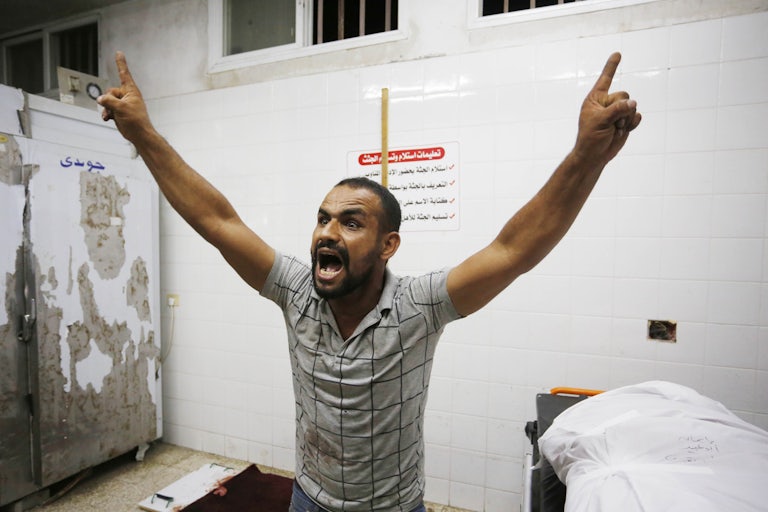Honestly recognizing and acknowledging the atrocious nature of Hamas’s betrayal of the Palestinian people and national movement on and since October 7 in no way excuses Israel for its own myriad depredations and abuses. Well over 90 percent of the Gaza population are refugees and their descendants from southern Israel who were displaced in 1947–48 and are barred from ever returning to their homes. Since 1967, Israel has maintained an extraordinarily repressive and predatory occupation in East Jerusalem, the West Bank, and the Gaza Strip. In the West Bank, the Israeli focus has been evolving from intensive colonial settlement to preparation for large-scale annexation, quite possibly accompanied by mass expulsions. And in Gaza, since 2007, Israel has maintained what many have rightly called an open-air prison—with occupation forces keeping a tight grip on the coastal waters, the airspace, the electromagnetic spectrum, and all places of ingress and egress except one small crossing controlled by Egypt—governed on the inside by a fanatical gang of particularly nasty inmates.
Israel’s human rights record in the occupied territories is nothing short of appalling. And there can be no peace or coexistence as long as the occupation persists. Ending the conflict requires the transition to some formula, whether two states, one state, or some sort of confederation, in which Palestinians gain self-determination and are no longer the disenfranchised subjects of a hostile foreign power. Such understandings are the very basis of the Palestinian national movement, as well as the policies of the Palestine Liberation Organization and of most Arab and international support and solidarity for the Palestinian cause.
But these well-understood grievances against Israel neither justify nor explain what Hamas did on October 7. By attacking southern Israel and essentially killing or kidnapping everyone they encountered, including Arab Bedouins and Asian laborers, Hamas effectively perpetrated two huge massacres: the first of Israelis on the day itself, and the second of the Palestinians being played out on a much grander scale by Israel. Hamas’s cynicism is so profound that it’s no exaggeration to call it an intentional human sacrifice of thousands of Palestinians in a desperate bid to increase the organization’s decades-long quest for dominance of the national movement.
Hamas knew what it was provoking, and that was the whole point of October 7. Since it was founded in 1987 by the Muslim Brotherhood in Gaza during the first intifada, the primary aim of Hamas has been to take over the Palestinian national movement and, eventually, inherit the Palestine Liberation Organization with its invaluable global diplomatic presence, including U.N. observer state status and over 100 embassies around the world. Hoping to split the Palestinian movement between Islamists and nationalists, Israel has consistently facilitated and bolstered Hamas.
In its early years, Hamas had to play second fiddle to the secular nationalists in Fatah who dominate the Palestinian Authority and the PLO. Hamas’s big breakthrough was the paroxysm of violence during the second intifada after the diplomatic crisis caused by the failure of the Camp David summit in the summer of 2000. In the first few months of violence during the fall of 2000, the overwhelming number of civilian injuries and fatalities were occurring among Palestinians, with very few Israelis hurt. Hamas saw the opportunity and began a notorious campaign of suicide bombings against Israeli targets, which rapidly intensified the scale and scope of the violence and traumatized Israelis to this day. Israel, as always, remained true to its doctrine of disproportionality, and when the dust settled, far more Palestinian civilians lay dead. However, Hamas had finally emerged as a potential contender for national leadership. The lesson was obvious: Violence worked for them.
Palestinian elections following the second intifada and the death of Yasser Arafat played out in a now-familiar Arab electoral result between Islamists and nationalists: Fatah leader Mahmoud Abbas easily won the presidency in 2005, while Hamas-backed candidates emerged as the largest bloc in the legislature in 2006. That’s strikingly similar to most elections following Arab Spring uprisings, when nationalists generally prevailed in all-or-nothing presidential elections whereas Islamists managed to piece together powerful legislative coalitions.
This uneasy coexistence didn’t last long, as Hamas violently expelled Fatah from Gaza in 2007 and secured control of territory for the first time. Fatah responded in kind in the West Bank, leading to the ongoing Palestinian split. Israel adopted a policy of maintaining this split as ideally crippling to the Palestinian national movement, working to ensure that a neutered and discredited Fatah remained in power in the small Palestinian self-administered enclaves in the West Bank while Hamas continued to rule in Gaza. Nonetheless, Israel accepted the need to episodically (and literally) cut Hamas down to size—while also always killing numerous Palestinian civilians in Gaza—through periodic bombing campaigns mockingly described as “mowing the grass.”
Israel believed that both Palestinian factions were essentially content with ruling their own little fiefdoms, but over the past couple of years Hamas has clearly been developing other ideas. It was making no headway in advancing control of the national movement, despite Israeli policies that made Fatah and the PLO look weak and pathetic. Hamas inmates and other Palestinian prisoners in Israeli jails have recently been treated much more harshly. The momentum of the national struggle seemed to have shifted decisively to the West Bank, led by unaffiliated armed youth gangs such as the “Lion’s Den,” an ad hoc militia group that has no allegiance to any established party and that formed in the warrens of Nablus’s Old City. Hamas leaders were being quietly shown the door by Turkey. And Qatar, which had been funding the Gaza economy under Hamas (with the approval of Israel, the United States, Egypt, and Fatah), started grumbling about the need for a more sustainable Gaza economy.
Worst of all, the broader Muslim Brotherhood movement in the rest of the Arab world—except for another enclave in western Libya—had effectively collapsed as a viable political force and network, leaving Hamas feeling isolated and increasingly dependent on the pro-Iranian Shiite Islamist network, with which it is politically sympathetic but religiously incompatible (Hamas are Sunni Islamists). In recent months, Hamas clearly decided to take drastic action against Israel that would force a change in a status quo that was no longer useful to them because they were slowly losing influence, momentum, and international backing, and they foresaw no end of that trend. Reports strongly indicate that they were egged on by Iran and Hezbollah in a series of meetings in Beirut, with the powerful Lebanese militia making vague promises (that, mercifully, have so far been ignored) to intervene if and when Hamas launched a major attack against Israel.
The worst part of Hamas’s cynicism is that it intended to provoke the kind of devastating Israeli overreaction that is unfolding on the ground today. There is no way that Hamas leaders were unaware that, as a matter of policy and doctrine, Israel would insist on inflicting wildly disproportionate losses on the Palestinians. Moreover, Hamas is trying to lure Israel into a prolonged reoccupation of the urban centers in Gaza in the hopes that it can launch an insurgency that begins to pick off Israeli troops in small numbers over time, even if initially the organization is smashed to pieces (along with much of Gaza and its population).
Hamas intends to use this insurgency to, at long last, succeed in taking over the national movement by pointing out that it and it alone is battling Israeli troops for control of Palestinian land. They would contrast this with the P.A.’s security cooperation with Israel in the West Bank while PLO leaders sit alone at the negotiating table listening to crickets and waiting for talks that Israel has long dismissed (largely by citing Hamas as an excuse).
That’s how and why Hamas placed over two million Palestinians in mortal danger, and achieved, in exchange, absolutely nothing except the mass murder of innocent Israelis that shocked the world and inflicted significant damage, however unfair, on the reputation of the Palestinian people and national movement generally. Not only did they make absolutely no provision for the civilian population of Gaza or provide any warning or indication of what they were going to do; they actively sought to provoke an Israeli attack that would inevitably involve tremendous suffering and countless deaths among the Palestinian civilians. Obviously, they intended to use Palestinian, Arab, and international outrage over this suffering to promote themselves and to justify, retroactively and prospectively, whatever violence they might deploy.
Just as Israel is squandering the international goodwill it sustained following the Hamas-led massacres of October 7, through that very killing spree Hamas similarly squandered a great deal of global sympathy for the Palestinians and their cause. It’s disastrous for the Palestinians that the most prominent Islamist group among them appears to behave little better than ISIS when given the chance. This plays into every possible anti-Arab, Islamophobic, and racist trope thrown at the Palestinians over the past hundred years of conflict, first with the Zionist movement and then with Israel.
Now that the Israeli attack on Gaza is in full effect, Hamas is getting what it not only wants but is counting on. This doesn’t absolve Israel of responsibility for its actions. But it does mean that Hamas has deliberately inflicted tremendous harm on blameless Palestinians to try to advance its fortunes in a political war of attrition against its Fatah rivals.
After the devastating 2006 conflict with Israel, Hezbollah leader Hassan Nasrallah was forced to go on Lebanese TV and claim that, had he known what the consequences of authorizing an attack on Israeli soldiers at the border would prove, he never would have authorized the operation. Everyone knew he was lying. By 2006, no one in Lebanon had any illusions about Israel’s attachment to disproportionality and determination to lash out at enemies with few scruples and considerable wrath. But at least Nasrallah had implicitly acknowledged how unpopular he had become outside of his own political base because of the devastation he had provoked. And the memory of that enormous national backlash in Lebanon is surely among the key factors holding Hezbollah back today.
Will Hamas leaders one day apologize to Palestinians in a similar fashion? It’s most unlikely, even if, when the dust settles and the smoke clears, it begins to dawn on Palestinians in Gaza and elsewhere that Hamas engineered a huge calamity not through miscalculation or incompetence but because of cynical and grotesquely self-serving political and strategic malpractice. Palestinians and their supporters need to face the reality that Hamas has intentionally engineered a massive national calamity. They should never forgive them.



